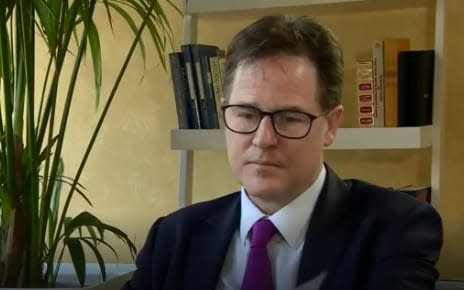Culture Secretary pledges social media will be regulated in rebuff to Facebook lobbying

Culture Secretary Jeremy Wright has slapped down Facebook’s global spokesman Nick Clegg who has been lobbying to water down Government plans to crackdown on social media firms.
Mr Wright, who met Mr Clegg in London before yesterday meeting Facebook founder Mark Zuckerberg, rejected the former LibDem leader’s proposals for “co-regulation” where Government and the tech giants would share developing new rules to police social media.
The Culture Secretary said: “It’s not a phrase I would use. The regulations will come from Government. If regulation is what is needed only Governments can produce it.”
His comments came as he warned the tech giants that the era of self-regulation is “coming to an end.” And although he was happy to discuss his White Paper plans with the tech firms, he was not going to be deterred from legislating to combat online harms.
“This is a conversation that is not predicated on the idea that anyone but the Government has the right to produce regulation and controls on behaviour,” he said.
“At the moment, there’s a situation where people are losing confidence in the ability of these companies to regulate themselves successfully and to deliver the kind of approach to online harms that people legitimately expect.”
In an interview during his US trip to meet tech chiefs, Mr Wright also confirmed the Government is seriously considering a comprehensive duty of care on social media giants that will require them to take responsibility for what appears on their websites.
Mr Wright, who has a 13-year-old daughter, said he was especially focused on ensuring that technology companies enforce minimum age standards. “We would expect them to do what is reasonable to keep their users safe and that includes ascertaining how old their users are,” he said.
He drew a line between an approach taken in Germany, which requires social media companies to block illegal content within 24 hours, and the Government’s proposals which will be revealed in a White Paper in the coming weeks.
“Different countries are taking different elements of this and pursuing them, but what’s clear is when we look around the world there’s no other country that has a holistic view and a holistic scheme of controlling online harms.”
He said that the advantage of such a requirement was that it would be applicable to future harms that emerge on social media, rather than legislating against particular threats.
“What we expect of online companies is that they keep their users as safe as they reasonably can and that’s against the background of a variety of different threats, as those threats change it is certainly an approach that we are seriously considering,” Mr Wright said.
He also indicated that the Government would fulfill a manifesto commitment to a levy on social media firms, saying the companies had a financial as well as a moral commitment. The industry is expected to shoulder the costs of any new regulator that must be set up to police the sector.
“Whatever system we come up with will doubtless have a cost attached and that cost will have to be met. We're going to make it clear what the responsibilities are from online companies in every respect including the financial,” he said.
